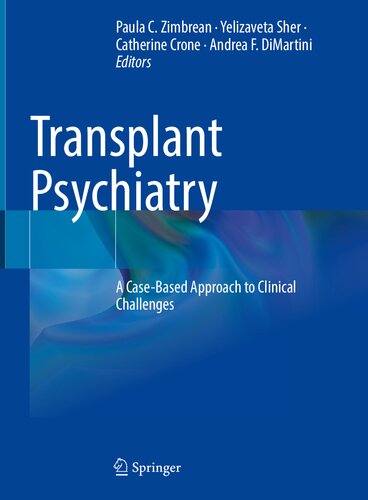| This book addresses the challenges clinicians face when working with patients facing complicated medical diagnosis for which transplantation is considered.
Written by experts in transplant psychiatry, each chapter approaches a common psychiatric challenge faced by transplant candidates and recipients. Chapters meticulously share clinical expertise that provides a framework for future discussions without neglecting the fact that each transplant patient is unique in the complexity of their medical diagnosis.
Additionally, the book examines complex issues including transplant-related posttraumatic stress disorder, post-transplant cognitive impairment, the collaboration between mental health and transplant clinicians, substance use and a wide range of other complicated topics.
Transplant Psychiatry is an excellent case-based guide to mental healthcare delivery for all clinicians who may work with transplant patients, including psychiatrists, psychologists and mental health professionals, transplant surgeons, internal medicine specialists, hematologists, transplant social workers and transplant coordinators. |
Table of contents :
Foreword
Contents
Introduction
The Patient’s Journey to Transplantation and Beyond
Organ Procurement, Allocation, and Organ Shortage
Part I: Psychiatric Disease in Transplant Candidates and Recipients
1: Mood Disorders in Transplantation: Depressive Disorders
Introduction
Case History
Discussion
Evaluation of Depression in Transplant Candidates and Recipients
Organ-Specific Presentations of Depression in Transplant Candidates and Recipients
Other Depressive Disorders
Suicidality in Transplant
Treatment of Depression in Transplant
References
2: Mood Disorders in Transplantation: Bipolar Disorder Spectrum
Introduction
Case History
Discussion
Risk Factors Associated with Transplant Candidates with BD
Medical Comorbidities in Patients with BDs
Psychiatric Comorbidities Including Substance Use Disorders
Risk of Difficulty with Adherence with Medical Treatment Associated or Not with Psychiatric Decompensation
The Pharmacological Treatment of Psychiatric Disorders May Impact the Graft Directly Through Direct Toxicity or Indirectly through Side Effects or Drug-to-Drug Interactions
The Impact of Transplantation upon the Course or Stability of the Psychiatric Disorder
Psychological Stress Associated with Transplantation
Psychiatric Side Effects of Immunosuppressant Medications can Overlap with Symptoms of BD
What Are the Important Pharmacologic Considerations in Treating BD Transplant Recipients?
References
3: The Suicidal Patient in Organ Transplantation
Background
Brief Overview of Risk Factors of Suicide
Suicide and Transplant Recipients
Suicide Risk Factors Specific to Transplant Patients
Suicide Attempts That Lead to Organ Transplantation
Case Histories
Case 1: Moira—Acetaminophen Overdose and Acute Liver Failure Requiring a Liver Transplant for Survival
Case 2: Frank—Descending into Depression and Suicidal Ideation After a Lung Transplant
Discussion
What Can Be Done to Modify Risk of Suicide in Transplant Candidates and/or Recipients?
References
4: Psychotic Disorders and Organ Transplantation
Introduction
Case History
Discussion
References
5: Anxiety, Cystic Fibrosis, and Organ Transplantation
Introduction
Case History
Discussion
Take Home Points
References
6: Panic Attacks in Transplant Recipients
Introduction
Case History
Discussion
What Elements of History or Psychiatric Interview Help Differentiating Panic Attacks from Symptoms of Cardiopulmonary Disease?
Are There Specific Treatment Approaches to Consider for Panic Disorder in Transplant Recipients?
References
7: Pre- and Post-Transplantation Post-Traumatic Stress Disorder (PTSD)
Background
Case History
Discussion
References
8: Personality Disorders in Transplant Candidates and Recipients
Personality Disorders in Transplant
Case Histories
Case 1: Antisocial Personality Disorder
Case 2: Narcissistic Personality Disorder
Discussion
References
9: Psychiatric Aspects of Obesity in Transplantation
Introduction
What Is Nonalcoholic Fatty Liver (NAFL) Disease?
How Is NAFLD Diagnosed?
How Is NAFLD Treated?
What NAFLD Specific Issues Should the Transplant Psychiatrist Be Aware of?
Binge Eating Disorder (BED)
Is There a BED and NAFLD Connection?
What Are Some challenges Facing Both Physicians and Patients?
Case History
Discussion
Case History (Continued)
Future Directions
References
10: Anorexia Nervosa in Solid Organ Transplantation
Introduction
Anorexia Nervosa: A Quick Review
What Might Anorexia Nervosa Contribute to Medical Illness, End-Stage Organ Disease Leading to Transplant and Poor Medical Outcomes with Transplant?
What Factors Should a Mental Health Assessor Consider when Evaluating a Transplant Candidate with Comorbid Anorexia Nervosa?
What Do we Know About How the Transplantation Process Might Impact Anorexia Nervosa?
Anorexia Nervosa and Living Donation
Case History
Discussion
What are some common post-transplant concerns for individuals with pre-existing AN?
Are there risk mitigation strategies, which might be helpful in improving outcomes for individuals with pre-existing AN?
Take Home Points
References
11: Body Image and Facial Transplantation
Introduction
Review of the Literature on Body Image
Body Image in Craniofacial Conditions
Psychosocial Rating Scales for Facial Transplantation
Body Image and FT
Pre-Existing Psychiatric Conditions and FT
Case History
Discussion
Conclusions
References
Part II: Cognitive and Neuropsychiatric Disorders
12: Delirium in Organ Transplant Recipients
Introduction
Case History
Discussion
References
13: Cognitive Impairment in the Pre-Transplant Setting
Introduction
Cognitive Impairment in Kidney Disease
Cognitive Impairment in Liver Disease
Cognitive Impairment in Heart Disease
Case History
Discussion
Conclusion
References
14: Intellectual and Developmental Disabilities in Transplant Patients
Introduction
Medical History of Intellectual and Developmental Disabilities
Approaches to Intellectual and Developmental Disabilities in Solid Organ Transplantation
Transplant Organ Types and Intellectual and Developmental Disabilities
The Role of Psychiatrists
Case Histories
Case 1: Autism Spectrum Disorder—Developmental Disability
Autism Spectrum Disorder: A Brief Review
Autism Spectrum Disorder and Transplantation
Restricted, Repetitive Patterns of Behavior, Interests, and Activity
Deficits in Social Communication and Interaction
Case 2: Danon Disease—Intellectual Disability
Danon Disease: A Brief Review
Intellectual Disability in Danon Disease
Psychiatric Disorders and Danon Disease
Discussion
Conclusion
References
15: Post-Operative Seizures in Transplantation
Introduction
Risk Factors for Post-Transplant Seizures
Treatments for Post-Transplant Seizures
Case History
Discussion
References
16: Post-Transplant Cognitive Impairment
Introduction
Case History
Discussion
Epidemiology and Etiologies of Post-Transplant Cognitive Impairment
Evaluation
Treatment
Pharmacological
Contributors
Substance Use
Non-pharmacological
Exercise and Diet
Social Support
References
Part III: Addictive Disorders in Transplant Candidates and Recipients
17: Alcohol Use Disorders in Organ Transplantation
Introduction
Case Histories
Case 1: Alcohol Use Disorder in a Transplant Candidate
Discussion
Which Factors Might Place this Patient in a Higher Risk Category for Transplant?
Does the Length of Sobriety before Transplant Matter?
How Should Teams Conduct Pre-Transplant AUD Evaluation, Treatment, and Monitoring?
How Should Transplant Teams Interact with Patient Families Regarding AUD?
What Can Transplant Teams Do to Facilitate Productive Pre-Transplant AUD Discussions and Decision Making?
Case 1 Outcome
Case 2: Alcohol Use Disorder After Liver Transplantation
Discussion
What Kind of Post-Transplant AUD Follow-Up and Monitoring Should Teams Implement?
How Should Transplant Teams Respond to Post-Transplant Drinking?
Are AUD Medications Safe to use in Transplant Patients?
How Should Teams Collaborate with Mental Health Providers Not Affiliated with the Transplant Center?
Case 2 Outcome
References
18: Psychiatric Evaluation of the Liver Transplant Candidate with Alcohol-Associated Hepatitis
Introduction
Clinical and Ethical Dilemmas
Case History
Discussion
The Role of the Transplant Psychiatrist in the Evaluation of Transplant Candidates with AAH
The Psychiatric Evaluation of Patients with AAH
Evaluate for the Presence and Severity of Psychiatric and/or Substance Use Disorders
Assess whether the Patient Possesses any Risk Factors Associated with an Increased Likelihood of Post-Transplant use of Alcohol, Drugs, or Tobacco
Estimate the Likelihood of Adherence to Post-Transplant Medications, Follow-Up Visits, and Addiction Treatment
Barriers and Solutions Encountered in the Psychosocial Interview of Patients with AAH
Post-Transplant Treatment of Alcohol Use Disorders
Text-Messaging Pilot Study
Randomized Controlled Trial (RCT) of Telepsychiatry in the Post-Transplant Phase
Multidisciplinary, Co-Located Alcohol Treatment Programs
References
19: Opioid Use Disorders in Organ Transplantation
Introduction
Background
Case History
Discussion
Conclusion
References
20: The Transplant Patient with Cocaine Use Disorder and Attention Deficit/Hyperactivity Disorder
Introduction
Case History
Discussion
Reflections on the Case Presentation
Relapses: Not the If but the When
Cocaine Use Disorder and ADHD
Conclusions
References
21: Cannabis Use in Transplantation
Background
Potential Risks of Cannabis Use
Non-adherence
Patient and Graft Survival
Infections and Cancer
Psychiatric Illness
Other Substance Use
Interactions with Immunosuppressants
Potential Benefits of Cannabis Use
Case History
Discussion
Conclusion
References
22: Tobacco Use and Transplantation
Introduction
Case Histories
Case 1: Pre-transplant Evaluation of a Patient with Tobacco Use
Case 2: Evaluation Post-transplant for Relapse on Tobacco
Discussion
How Would You Assess This Patient’s Risk for Tobacco Relapse?
How Can Tobacco Use Be Monitored After Transplantation?
What Treatment Options Exist for Patients Regarding Tobacco Cessation?
References
23: Gambling Disorders in Organ Transplant Recipients
Introduction
Case History
Should Screening for Pathological Gambling Be a Part of Routine Pre-transplant Mental Health Evaluation?
Case History (Continued)
How Can GD Influence the Care of Transplant Recipients?
Case History (Continued)
What Interventions Are Available for Pathological Gambling and Can They Be Implemented Before or After Transplantation?
References
Part IV: Psychiatric Disease and Systems of Care in Organ Transplantation
24: Challenges in the Patient–Clinician Relationship
Introduction
Case History
Discussion
Initiation of Psychotherapy
Direct Psychiatric Consultation to the Primary Team
Consultation to the Interdisciplinary Care Team
Nursing Education
References
25: The Multiple Roles of the Transplant Psychiatrist
Introduction
Case History
Discussion
The Pre-transplant Psychiatric Evaluation
The Pre-transplant Risk Assessment
Contributions to the Longitudinal Mental Health Care of Transplant Patients
Team Education About Psychiatric Symptoms, Diagnosis, and Prognosis
References
26: Interprofessional Teamwork in Organ Transplantation
Introduction
Case History
Discussion
What Are Key IPT Principles Relevant to Transplant Psychosocial Clinicians?
What Strategies Can Psychosocial Clinicians Use to Optimize Interprofessional Communication with Medical and Surgical Colleagues?
How Can Psychosocial Clinicians Best Collaborate When New Psychosocial Team Initiatives Require Additional Training and Create Additional Work for Medical and Surgical Colleagues?
Describe Key Interprofessional Strategies That Can Maximize IPT Among Psychosocial Specialists
What Potential Barriers Exist to Improving Transplant Psychosocial IPT?
Conclusion
References
27: Evaluation of the Incarcerated Transplant Candidate
Background
Psychiatric Comorbidities in Correctional Settings
Prisoners and Aging
Legal Precedents in the Provision of Medical Care for Prisoners
Case History
Discussion
References
Part V: Effects of Chronic Illness and /or Transplantation
28: Impact of the Transplantation Process on the Caregiver
Introduction
Why Do Patients Need Family Caregivers?
What Are the Costs and Benefits of Caregiving for the Caregiver?
Case History
Discussion
References
29: Challenges with Adherence with Medical Care
Introduction: Adherence in Organ Transplantation
Case History
Discussion
Healthcare System
Clinical Factors |



